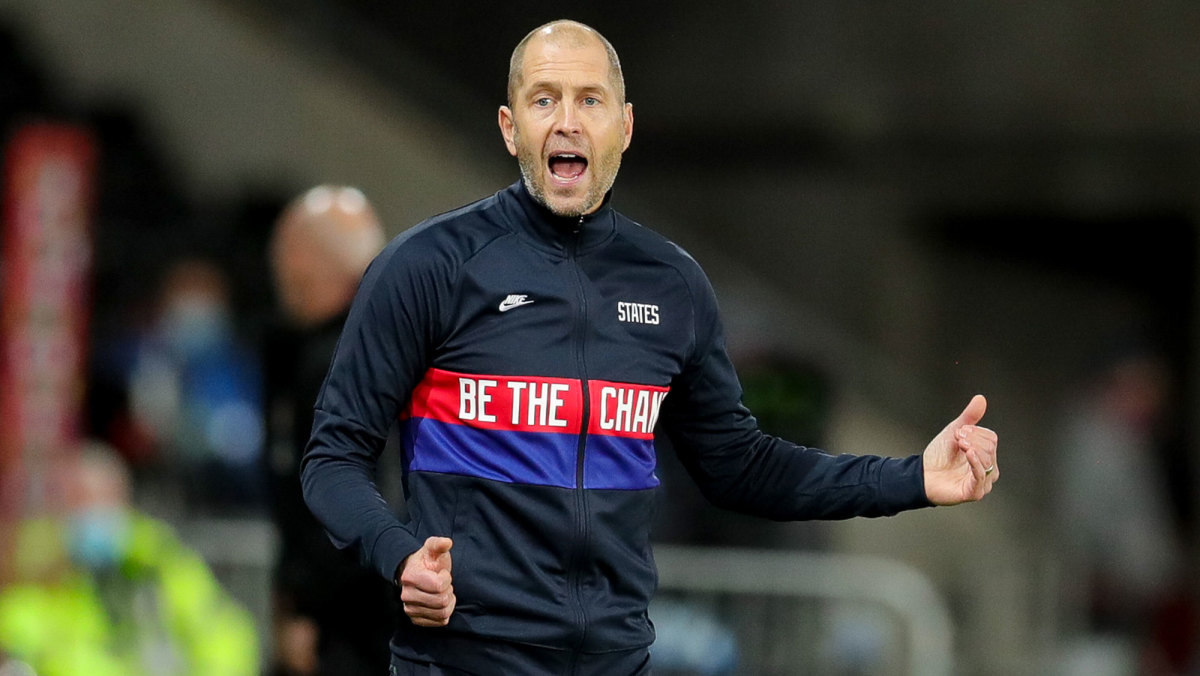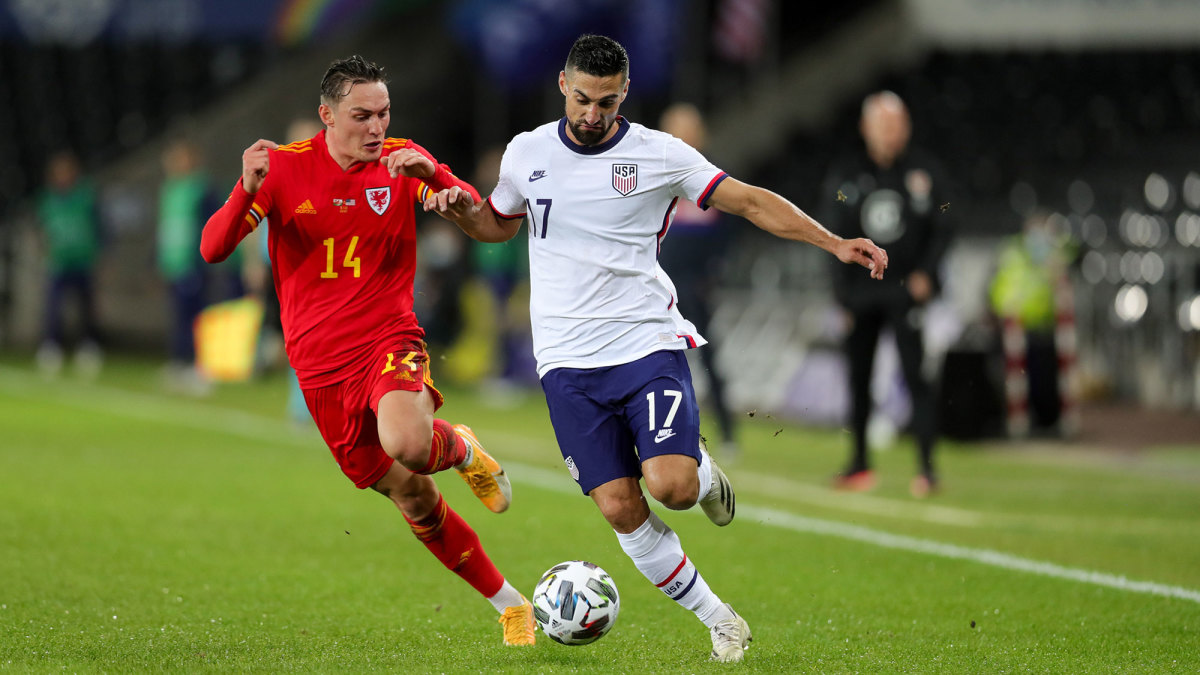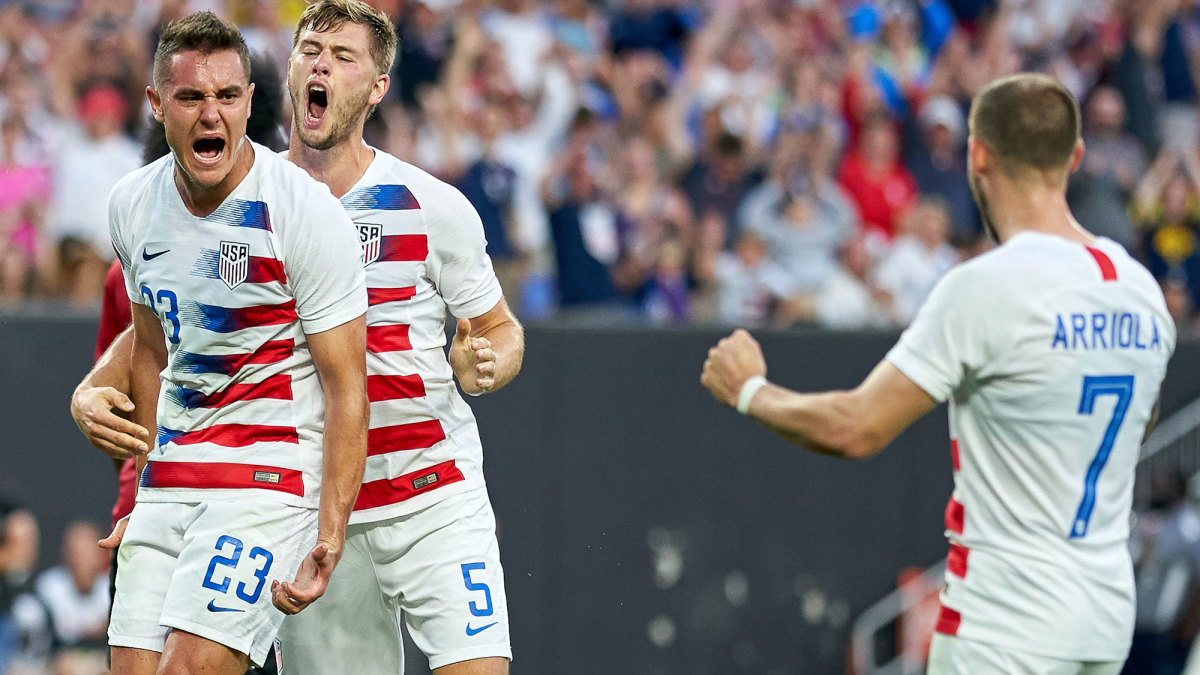USMNT's Challenge vs. El Salvador: Molding a New Group Into the National Team's Way
The records will indicate that after the long pandemic pause, the U.S. national team played three games within a month—November’s friendlies against Wales and Panama in Europe, and then Wednesday night’s exhibition against El Salvador in Fort Lauderdale, Fla.
Technically, it’s the same team—the statistics will be merged, the uniforms will look familiar and coach Gregg Berhalter and his staff will be in charge. But that’s where the common threads end. It’s not the same team in any practical sense, apart from the presence of two depth players, Sebastian Lletget and Sebastian Soto, who coincidentally were available for both camps. Last month, Berhalter was able to call upon his star-studded, European cohort, many of whom are at Champions League clubs. This month it’s an almost entirely MLS-based contingent, 12 of whom are uncapped at the senior level.
The roster composition makes sense, since the El Salvador game doesn’t fall during a FIFA window and U.S. Soccer felt something was better than nothing. Growing the player pool is in Berhalter’s immediate interest with the start of World Cup qualifying, the Concacaf Gold Cup, the inaugural Nations League finals and the Olympics all crammed together during a hectic 2021. But that doesn’t make any of this easier, blending and integrating a player pool based on different continents that gathers and grows piecemeal, separated by so many months and miles. Building a national team out of these national teams is Berhalter’s challenge. The El Salvador game represents yet another step in that process.

“It’s really fun. It’s a really big challenge for us,” Berhalter said Tuesday. “If you think about just having to work with guys and put a product on the field that the fans will appreciate and the guys are proud of, it’s work. But there’s no better group of guys to work with than the group I'm working with and I mean that seriously. When we get in camp these guys just push, and they focus and they work really hard and they’re open, and it’s such a good group to work with and that’s why it’s a fun challenge.
"When you’re having to reteach things to a totally new set of players with 10 days’ turnover, that’s what’s fun about this job. We really enjoy it,” he continued. “It’s been a fun year in that sense.”
There was a 2020 before the pandemic, and for the national team, it was highlighted by a January camp that concluded with a 1-0 win over Costa Rica. There’s significant carryover from that camp to this team, and although those carefree times must feel like eons ago for many, the principles of play didn’t fade. Berhalter has picked an approach and is sticking with it, which helps players regain some comfort and familiarity even if there are significant stretches between call-ups.
“Gregg does a good job of bringing players in and explaining to them what kind of soccer we’re going to play. That’s possession-based. It’s high work rate. It’s getting to goal as fast you can, and I think he’s already doing a great job of acclimating guys who are here for the first time,” midfielder Brenden Aaronson told Sports Illustrated from camp. “I think that learning all the stuff that we need to as a team tactically really showed at that January camp. I think that was huge, and I think that Gregg and the staff here do a great job of just explaining how we want to play. It’s my fourth time in, so now it’s getting clearer and clearer, and it’s getting easier and easier for me.”
The latter games of last year’s Nations League group stage and then the January camp helped finalize Berhalter’s commitment to high pressing out of a 4-3-3, which requires athleticism, commitment and cognitive cohesion. It’s higher-risk, higher-reward soccer, but the way it can help the USA control the tilt and tempo of a game was evident during significant stretches against Wales and Panama last month. Expect to see similar against El Salvador.
“I think with the process of this group, it’s continuing to move them along in a similar direction. So when you think about January camp, we started to high press with our three midfielders and three up top. We continue that [against] Wales and Panama, and it’s something we’ll continue on now in this game here,” Berhalter said Tuesday.

He showed the current campers highlights of last month’s games in Europe.
“It was important to use some footage of that, use some footage of training, use some footage of the game, to show exactly how we do it,” he said. “It’s been a really good week. The guys have been working really hard, and you can see they’re excited. They’re excited to be able to play the game.”
San Jose Earthquakes midfielder Jackson Yueill, another January camp veteran, said, “We watched the [November] games and we talked about different things that we can look at that maybe as we’re moving forward we can improve on. … With all the camps coming up next year, the gap this year was unfortunate, but I think the coaching staff does a great job of keeping everyone informed and making that group as cohesive as possible.”
It could be worse. El Salvador, which is managed by former Chicago Fire boss Carlos de los Cobos in his second stint with the side, hasn’t played since a friendly loss to Iceland in January. De los Cobos has called up a mostly-domestic squad with a couple of familiar faces sprinkled in, including Houston Dynamo midfielder Darwin Cerén and recent Portland Timbers and New York Cosmos midfielder Andrés Flores. El Salvador’s team is generally more internationally experienced than this USA squad, which might provide a small boost as La Selecta looks for just its second win against the Americans in 23 all-time attempts.
Berhalter can counter with a bit of experience if he chooses. Goalkeeper Bill Hamid has seven career caps, while D.C. United teammate Paul Arriola has recovered from an ACL injury and has 33 caps and five international goals to his name. Central defenders Aaron Long (17 caps) and Walker Zimmerman (12), and midfielder Kellyn Acosta (23), also have some international pedigree, while Soto—who’s available thanks to a red card suspension at his club in the Netherlands—announced himself with two goals last month in his senior debut against Panama.

Among those unavailable to play are Orlando City striker Daryl Dike, who suffered an injury in training, and forward Efrain Alvarez and midfielder Andrés Perea, who would have to file a one-time change of association because they previously represented Mexico and Colombia, respectively, in FIFA youth tournaments.
“We’re looking for a high-pace game, at least from our point of view,” Long said. “We definitely want to push the tempo. We want to dominate the game. We want to have a lot of the ball. We want to play in their end.”
That might be asking a lot of a young group that’s had just a few days to train together, but it’s clear from talking with players that Berhalter’s principles are consistent and comprehensible. That seems to put them at ease and makes them more comfortable approaching opponents on the front foot.
“In terms of Gregg, he’s an amazing coach. He’s kind of perfect for this job, because he’s great at bringing the group together,” said Long, the New York Red Bulls center back. “We’re only in camp for a short amount of time, and the way he can get the group to gel—the little activities we have off the field and the drills we do on the field to make sure we’re tactically ready but also on the same page—because it seems like every camp now that we’ve been in, they’re always introducing some new guys, some young guys, bringing the youth in and making sure our player pool can get even bigger.”
Added Yueill: “The ideas that are told are told until you understand them, and they allow questions to be asked. And I think a lot of the guys have a clear idea of what’s happening, and, it’s a credit to the coaching staff, because they do a great job of getting everyone integrated very fast. So even though our last camp was January, I think in one-to-two days everyone was picking it up very quickly, the ideas and kind of how we want to play as a team.”
